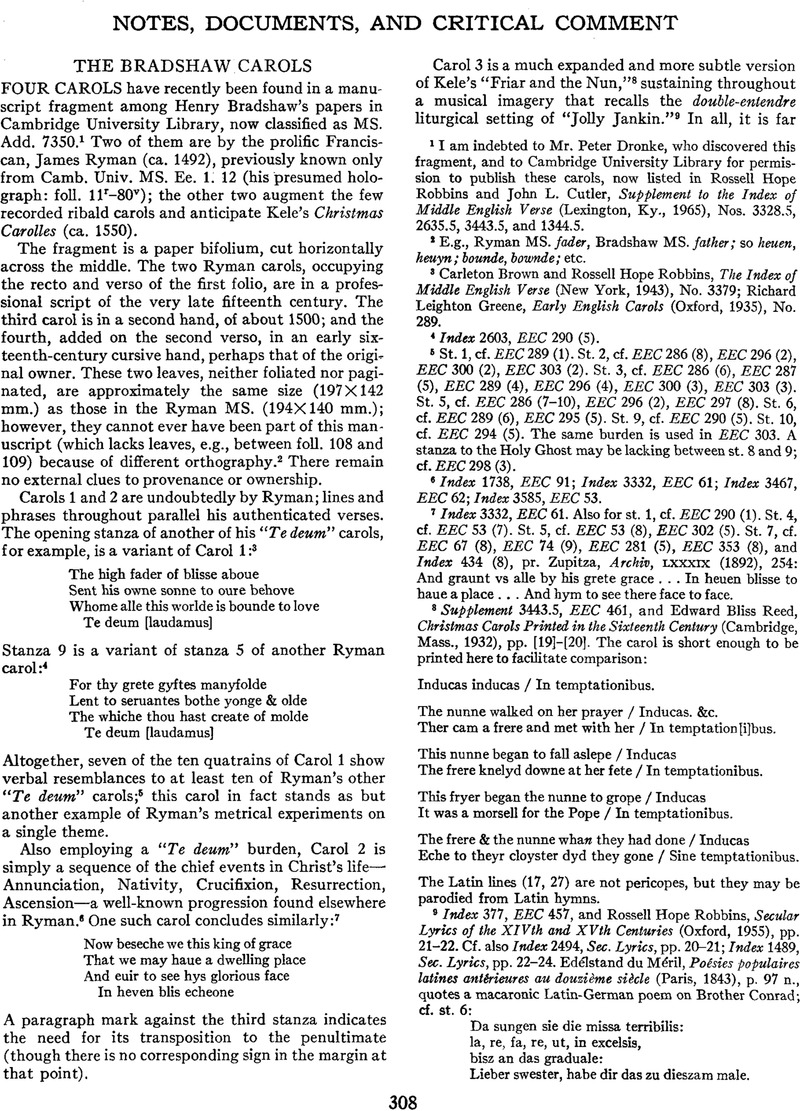Published online by Cambridge University Press: 02 December 2020

1 I am indebted to Mr. Peter Dronke, who discovered this fragment, and to Cambridge University Library for permission to publish these carols, now listed in Rossell Hope Robbins and John L. Cutler, Supplement to the Index of Middle English Verse (Lexington, Ky., 1965), Nos. 3328.5, 2635.5, 3443.5, and 1344.5.
2 E.g., Ryman MS. fader, Bradshaw MS. father; so heuen, heuyn; bounde, bownde; etc.
3 Carleton Brown and Rossell Hope Robbins, The Index of Middle English Verse (New York, 1943), No. 3379; Richard Leighton Greene, Early English Carols (Oxford, 1935), No. 289.
4 Index 2603, EEC 290 (5).
5 St. 1, cf. EEC 289 (1). St. 2, cf. EEC 286 (8), EEC 296 (2), EEC 300 (2), EEC 303 (2). St. 3, cf. EEC 286 (6), EEC 287 (5), EEC 289 (4), EEC 296 (4), EEC 300 (3), EEC 303 (3). St. 5, cf. EEC 286 (7–10), EEC 296 (2), EEC 297 (8). St. 6, cf. EEC 289 (6), EEC 295 (5). St. 9, cf. EEC 290 (5). St. 10, cf. EEC 294 (5). The same burden is used in EEC 303. A stanza to the Holy Ghost may be lacking between st. 8 and 9; cf. EEC 298(3).
6 Index 1738, EEC 91; Index 3332, EEC 61; Index 3467, EEC 62; Index 3585, EEC 53.
7 Index 3332, EEC 61. Also for st. 1, cf. EEC 290 (1). St. 4, cf. EEC 53 (7). St. 5, cf. EEC 53 (8), EEC 302 (5). St. 7, cf. EEC 67 (8), EEC 74 (9), EEC 281 (5), EEC 353 (8), and Index 434 (8), pr. Zupitza, Archiv, lxxxix (1892), 254: And graunt vs alle by his grete grace … In heuen blisse to haue a place … And hym to see there face to face.
8 Supplement 3443.5, EEC 461, and Edward Bliss Reed, Christmas Carols Printed in the Sixteenth Century (Cambridge, Mass., 1932), pp. [19]–[20]. The carol is short enough to be printed here to facilitate comparison:
9 Index 377, EEC 457, and Rossell Hope Robbins, Secular Lyrics of the XIVth and XVth Centuries (Oxford, 1955), pp. 21–22. Cf. also Index 2494, Sec. Lyrics, pp. 20–21; Index 1489, Sec. Lyrics, pp. 22–24. Edélstand du Méril, Poésies populaires latines antérieures au douzième siècle (Paris, 1843), p. 97 n., quotes a macaronic Latin-German poem on Brother Conrad; cf. st. 6:
10 Reed, Christmas Carols, p. 78; same passage quoted by Charles Read Baskervill, The Elizabethan Jig (Chicago, 1929), p. 24. Baskervill quotes similar references in Miles Coverdale's The Christen State of Matrimony and (title of carol) in John Playford's Dancing Master.
11 Supplement 1641.5, EEC 460. Cf. also “Silver White,” Index 438, Sec. Lyrics, pp. 26–27; “Jolly Forester,” Supplement 4068.6, EEC 466.
12 With two exceptions: Index 1471, EEC 21D, found in three other MSS, has been added later on fol. 1r; Index 2332, EEC 81, found in Kele's Carottes. The circulation of this latter carol is noted by Richard Leighton Greene, A Selection of English Carols (Oxford, 1962), p. 47.